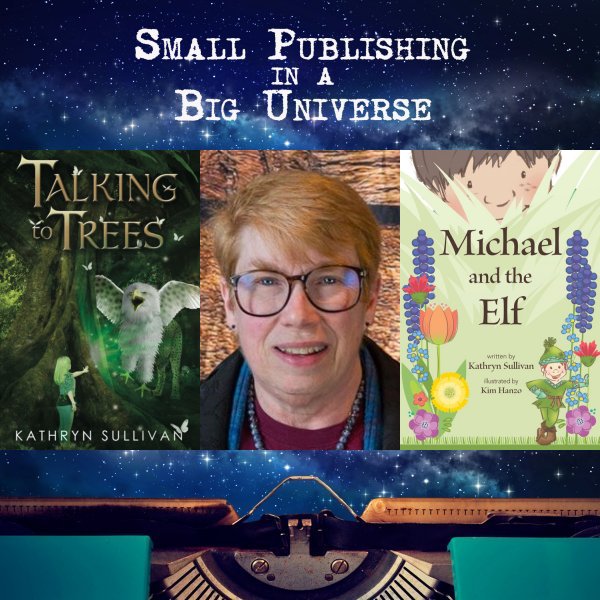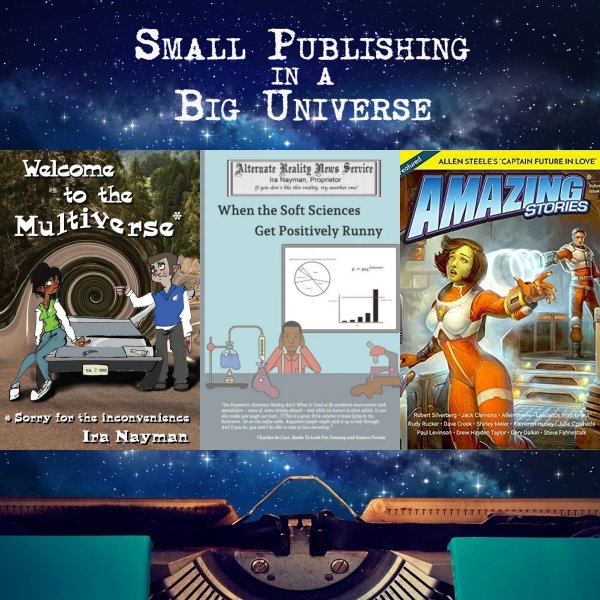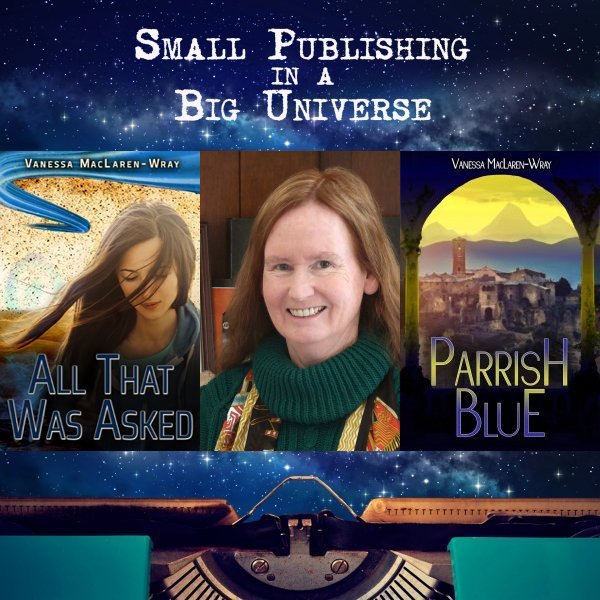[00:00:08] Speaker A: Hello, and welcome to small publishing in a big universe. I am your host, Lisa Jacob. This month we have an interview with author Greg Stone, who has a new book coming out this month from our sponsors. This month from Water Dragon flashes in time by Miko Rahalla in Dragon the Psychic on the Jury by Brian Ce Boolean paper Angel Press has deadline on arrival by Greg Stone. Stay tuned for our interview.
Detective Ronan Mazzini returns in Greg Stone's newest novel, Deadline on arrival. Thrust in the cutthroat world of newspaper reporters and investigative journalism, he is talked into bringing along Boston observer reporter Ollie Burns on his investigation. People who were profiled in the observer are being systematically murdered, and it's up to the team of a detective with a low level superpower and an intrepid reporter to solve the mystery. Deadline on arrival is available this month from Amazon, Barnes and Noble, Kobo, Smashwords, and other online booksellers. Or support your local bookstore by ordering it through bookshop.org dot. For more information, visit their
[email protected].
[00:01:47] Speaker B: Welcome to small publishing in a big universe. I am your host, Lisa Jacob. The guest I have with us today is Greg Stone, the author of Deadline on arrival. He's also the author of another mystery, which takes place five years after deadline. Dangerous inspiration. Welcome, Greg.
[00:02:06] Speaker C: Thank you, Lisa.
[00:02:08] Speaker B: First question I have for you is what is your most recent book about?
[00:02:12] Speaker C: It takes place in the news business centers on a particular newspaper in the Boston area, and what is happening is that certain people who are profiled in the paper are killed, and the investigation falls on Ronan Mazzini, the main character and one of the investigative reporters at the paper by the name of Ollie Burns.
[00:02:37] Speaker B: So why did you write this book, and what was the inspiration?
[00:02:43] Speaker C: To tell you the truth, in a prior life, I did a lot of production work and wrote a bunch of screenplays, eight or ten of them. I actually produced an independent movie at one point, and I had written a teleplay for the old murder. She wrote series to use as a writing sample, which was based on a similar story. So it's been sitting around for a while, and I thought, hmm, that might make an interesting book. And I spent many years as a reporter. I was a writer at Time Inc. In New York and a tv reporter in Boston and Minneapolis and on PBS. So I spent a lot of time in newsrooms, and that world is familiar to me. So I figured that I could bring that to life, then also bring the mystery to life at the same time. That was the motivation.
[00:03:31] Speaker B: So the inspiration must have been your time at the newsroom?
[00:03:34] Speaker C: Yes. Newsrooms are not nice places. The news business is not for the faint of heart. People who run them often yell when things go awry, which happens about every 20 minutes. The pressures are unbelievable. I don't think people realize how hard it is, especially in tv news, because you get an assignment at 09:00 or 10:00 in the morning. You have to go out and shoot the story, not yourself. You always work with a camera person, so you have to find people to interview, shoot the interviews, shoot the b roll, which is the generic footage that accompanies the story, come back in the afternoon, screen the tapes, edit the footage, and get it on the air by 06:00 or 530. And that's what you do day after day after day. And every time I enter tv newsrooms, I would say to myself on the way in, in the morning, remember, Greg, you're entering a parallel universe which has nothing to do with reality. And at 06:00 or 07:00 or 08:00 when you leave, then you come back to the streets that we all recognize as the real ones, and you're back to the world as we know it. It really is a strange world, and it does beat you up after a while.
[00:04:50] Speaker B: Well, I noticed that your newsroom is in a newspaper. Is it similar or different than tv news?
[00:04:58] Speaker C: That's an interesting question. When I was a tv reporter here in Boston, it was said that the Boston Globe had 400, 400 editorial employees.
There were so many that there were people who didn't really do much. They just sat around in their cubicles, and anytime anything happened, they could throw 20 or 30 bodies at a story, no problem in a tv newsroom at that point, there might have been 25 editorial employees on duty at any given .6 or eight reporters out on the street, a few producers, a bunch of camera people, an assignment desk, and so on. So the resources were stretched much more thinly, which is why tv often follows print, because the assignment desk might read a story in the Boston Globe and assign a reporter to cover it, because it's very difficult to cover a big city like Boston, or any other big city, for that matter.
[00:05:59] Speaker B: Does your real life influence your novels?
[00:06:02] Speaker C: Absolutely. I come from an italian and albanian family. My dad's family was albanian, my mom's was italian, although my dad's albanian family came to this country through Italy. My mom spoke italian at home when I was a kid. So I have a pretty, for want of a better term, ethnic background, even though my name is Gregory stone. And so I put some of that into mazzini. Although he's half irish, I have no irish blood in me. But he's a little bit of a mixture of many different backgrounds. He's also quite literate. My family was extremely literate. My dad was the first one to go to college. My mom never went to college. But there were a lot of books in our house, a lot of discussion about books and philosophy and art and politics. I've always been a voracious reader, so I tried to create a detective who brings a sort of a literary mentality to bear without hopefully being too abstruse about it.
[00:06:59] Speaker B: I understand that you've done business writing and nonfiction. What do you think are some challenges between moving from nonfiction business writing to fiction mystery writing?
[00:07:12] Speaker C: Great question. I have published two business books, with a third one actually coming out in June, and I swear to you, I'm done with nonfiction, because if I never see a footnote or a bibliography again, it'll be too soon. Because in this crazy, litigious world we're living in, you have to footnote everything, and you have to be extraordinarily careful about sourcing things. Now, that's the right approach. I don't deny that, but it's also very laborious. So when I first started trying my hand at writing novels, I thought, wow, this is great, because I don't have to worry about footnotes and sourcing. I can just make it up. And then I realized, yeah, Greg, that's the hard part. You have to make it up. If I'm writing the Lisa Jacobs story, I interview you about your childhood, your experience as a writer, editor, whatever. I put it all together, hopefully in a coherent framework. I don't have to make up your life story, because you've already lived it. But if I create a character named Lisa Jacob, I have to create everything out of whole cloth, and I find that very satisfying, but at the same time, very difficult. I've always been a writer, and the way I became a mystery writer is actually a story in itself. I'd always been interested in writing novels, but for whatever reason, never got around to it. I spent a lot of time doing teleplays and screenplays. As I said, about five years ago, I had back surgery and had a complication. Ended up in intensive care, basically drugged out of my mind and to the point that my wife would come to visit me, and I would say something. She'd be on this side of me, sitting in a chair, and I would start talking to somebody over here, and she would say, greg, who are you talking to? And I said, well, I'm talking to. I'm talking to.
I'm talking to that guy. And even I realized that there was nobody there. And I was also reading crime and punishment at the time on my Kindle. Great book, but depressing to read when you're delirious because the main character in that book is totally delirious, as well as a mystery novel. And I put the novel down and I'd say, oh, that's what happened next. And I would envision the next scene. Then I realized I was creating that in my mind. And so when I came out of the hospital, thankfully, I recovered fully. It's all good. I said, maybe I can write a mystery novel. And so I started to do it, and lo and behold, formed a relationship with paper Angel Press, which was kind enough to published my first book and now my second. So here I am.
[00:09:44] Speaker B: What are some of the things that you usually do to market your book?
[00:09:48] Speaker C: That's the hard part, kind of like the film business. The hard part of the film business is raising the money and selling the film. The easy part is making the film. In the book business, it's easier to write a book than it is to sell it. So what I do is I had a couple of events for my first novel at a local beer hall slash restaurant. For $50, the guests would get a flight of beers, a few snacks, and a copy of the book. And that was pretty successful. And I tried to get book reviews unsuccessfully. It's very, very hard because book reviewers have been laid off and very few newspapers have them. So I found the action is on social media that you have to push your book on Facebook and Instagram. Those are my two social media of choice. And pushing the book there is a little bit dicey because you don't want to be overly promotional because then people get sick of it. But one thing I'm going to try to do with this new book is write to a bunch of mystery book bloggers and fans on Instagram. I have a list of a couple hundred of them, so I figured I would send them the electronic version of the book and say, I hope that you will consider this at your next meeting. Many of them are book clubs, and we'll see what happens from that. I'm 71. I was 70 when dangerous inspiration came out. And I thought, boy, older, first time novelist, what a great story. And all the newspapers and magazines are like, oh, no, I joined the club. There are a lot of older people writing. So that didn't get me anywhere. I was lucky enough to go to Harvard, and Harvard magazine did a piece about me, which was cool. So I'm waiting to see what impact that might have had on sales, but very hard to get coverage.
I try to post stuff on Facebook that I find interesting, stuff about poetry or films or philosophy. I have found that videos work the best, that if you turn it into a video, it's much more interesting than just a static post. I'm a media consultant by trade, so I follow all this stuff, and I think people misuse social media quite a bit.
[00:11:57] Speaker B: Did you self publish when you did the business books?
[00:12:00] Speaker C: Yes. My first business book, which is called artful 50 lessons from creative geniuses, has nice pictures on one page and prompts on the facing pages to sort of jumpstart your creativity with regard to marketing and strategic issues in business. I had an agent, we tried to find a publisher, couldn't, and finally I decided to self publish it on Amazon. My second and third business books are being distributed through traditional publishers, so I've had experience with both. And of course, paper Angel Press is a traditional publisher for my novels as well. I think there are advantages and disadvantages to each. With traditional publishing, you have a team to help you, help you design the COVID help you edit it, to an extent, help you market it, but you don't have as much control necessarily. When you self publish, you have total control. But if you find the right traditional publisher, the lack of full control doesn't really matter. And I think time was when there was a stigma to self publishing. I think that's gone because a lot of people have managed to launch careers through self publishing. I've also been told that the New York Times has reviewed self published books. I don't know if that's true. I heard it was true, whereas six, seven years ago, they wouldn't touch them with a ten foot pole. But I think on balance, when you publish through a traditional publisher, it gives you a little more clout. It's as if a third party gave your book a seal of approval. Somebody looked at it and said, this is good enough to put out to the world under our imprimatur. And I think that means something.
[00:13:38] Speaker B: Where can people contact you?
[00:13:41] Speaker C: My website is easy to remember. It's gregstone.com g dash egstone.com. you can find a forum on my website. Love to hear from readers. Love to hear from people in general. I'm a social guy. I love to talk about things with people. So please, thank you very much for.
[00:14:00] Speaker B: Your time and good luck with your book.
[00:14:04] Speaker A: Thanks again to our guest. We plan on publishing new episodes every second Wednesday of the month. Watch for new episodes around that time. If you want to know more about small publishing in a big universe, visit our website at sPBU dash podcast.com and subscribe to our newsletter. Send us your feedback by using the contact us link, like us on Facebook at Spbupodcast tweet or X USPU UnderlinePodcast. To find out more about the books and other products featured during this episode, please visit the SPBU Marketplace at SPBU Dash marketplace.com. this podcast was recorded and edited by yours truly. Lisa Jacob executive producer is Stephen Radecki. Theme and ad music is provided by Melody Loops. Enhanced transcription services are provided by Lisa Jacob. This month's episode was sponsored by Water Dragon Publishing and paper Angel Press. See them at Bacon 2024, July 4 through 7th at the Santa Claus Marriott in Santa Clara, California. Also, visit some of their authors at Readercon at the Boston Quincy Marriott in Quincy, Massachusetts, July 11 through the 14th. You can listen to our podcast on Apple Podcasts, Spotify, Amazon music, and most of your favorite podcast services. Thank you very much for listening and talk to you soon.


